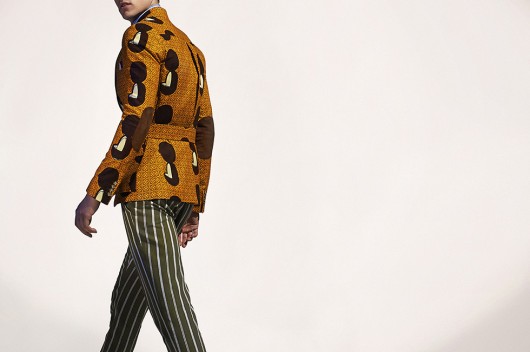 Un look uomo firmato Stella Jean
Un look uomo firmato Stella Jean
Nell’ultimo «Milan Fashion Global Summit», gli imprenditori di settore hanno scoperto la moda sostenibile. Possiamo dire, addirittura, che ne hanno decretato la fortuna, che l’hanno fatta diventare un trend. Lo slogan è stato «Mangia come ti vesti». Che significa – in parole povere – vestitevi domandando qualità negli abiti e negli accessori. E pretendete che siano realizzati a basso impatto ambientale. C’è da rallegrarsi o da preoccuparsi? Lo vedremo in seguito se e come il progetto si realizzerà. Cosa non facile. Infatti se la produzione pulita del tessile è un must cui dobbiamo aspirare, lo è altrettanto il miglioramento delle condizioni umane e lavorative degli sconosciuti operatori della moda low cost, male alloggiati, mal pagati ed esposti a sostanze tossiche (e questo solo per farla breve). Ma ciò interessa a pochi. Perché se l’alto artigianato Made in Italy è da sempre un fiore all’occhiello del rapporto qualità/prezzo – dato che giustifica il costo del prodotto con l’ingegno, la bontà della materia prima e l’originalità con cui viene eseguito da persone adeguatamente retribuite – questo non può dirsi della miriade di prodotti che arrivano nei negozi da tutto il mondo. Un progetto interessante di delocalizzazione della produzione volto al miglioramento della qualità della vita degli abitanti del paese, è intanto portato avanti dalla stilista italo-haitiana Stella Jean. Stella ha scelto di realizzare una parte della collezione Primavera/Estate 2015 impiegando tessuti realizzati in Burkina Faso da gruppi di tessitrici locali, organizzati in cooperative e in aziende individuali, coordinati tutti da un hub centrale, gestito dal programma di moda etica «Ethical Fashion Initiative» di ITC, agenzia dell’ONU. Stoffe, colori e lavorazioni sono bio; taglio e gusto fusion o occidentali. Un buon incontro. Luisa Ciuni
In the last «Milan fashion global summit»
the fashion industry has discovered sustainability. We can even say that it has become a trend. The claim was “Eat the way you dress”. It means- in a few words – dress asking for quality clothes and accessories. Made with the minimal environmental impact. There’s to be happy or worried? We’ll see if and how this project will be fullfilled. Not easy. In fact the eco-friendly production of fabrics is an objective to achieve, as well as the improvement of the human and working conditions of the unknown workers of low-cost fashion, that are badly housed, underpaid and exposed to harmful substances (and this is just to sum up). But this interests only a few. Because if the high italian craftmanship has always been the feather in the cap of the price/quality ratio – because it justifies the product’s cost with the concept, the goodness of raw materials and the skills of adequately paid workers – this doesn’t happen with that mass of products that come in shops from all over the world. An important project of production’s outsourcing, intended to the improvement of life quality, is carried on by the Italian-Haitian designer Stella Jean. Stella chose to make a part of her s/s 2015 collection using fabrics made in Burkina Faso, by groups of local weavers organized in cooperative or individual companies coordinated by a central hub, managed by the “Ethical Fashion Initiative” of ITC, agency of ONU. Fabrics, colours and manufacturing are organic; cuts and taste are fusion or occidental. A great mix. Luisa Ciuni
 Un look uomo firmato Stella Jean
Un look uomo firmato Stella Jean




